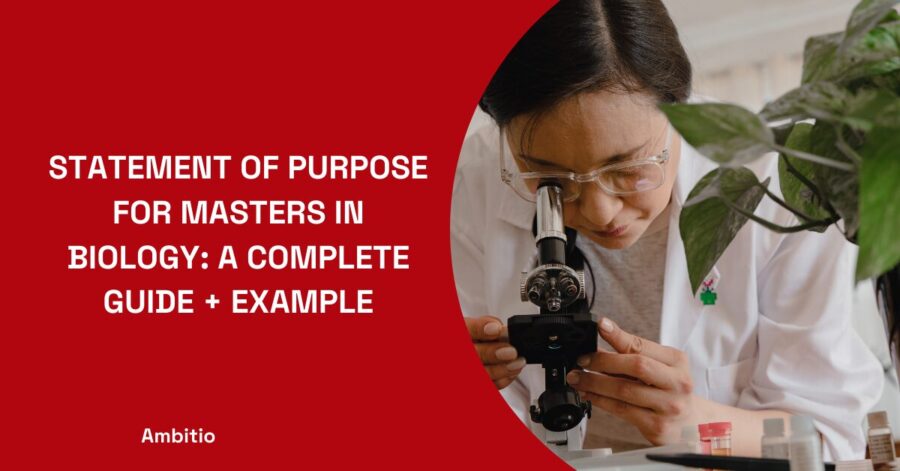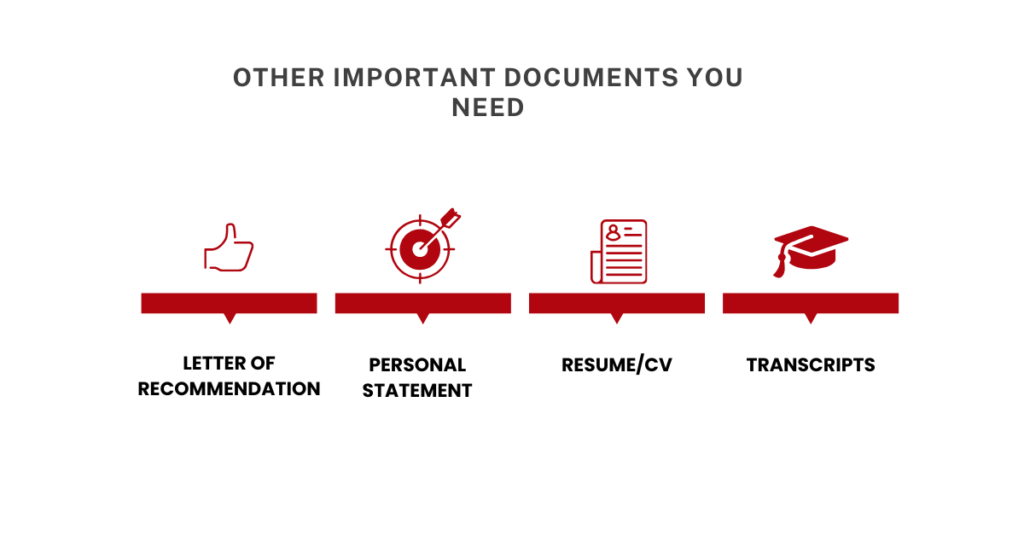5 May 2025
5 minutes read
Statement Of Purpose For Masters In Biology: A Complete Guide + Example

Key Takeaways
- Write a statement of purpose for masters in biology that sounds real, focused, and tailored to the program — not like every other SOP.
- Open with clarity, not clichés, and show how your experience connects with specific lab work or research goals.
- Shortlist universities based on research opportunities, tuition, and alignment with your personal and academic goals.
I’ve loved biology since 8th grade — said 97% of SOPs that got ignored.
Admissions committees aren’t looking for childhood crushes on science. They’re scanning hundreds of statement of purpose essays trying to find a brain that actually fits their lab. You’ve got about 30 seconds before they move on — if your SOP for biology sounds like everyone else’s, you’re done.
I have seen most SOPs fail not because the applicant isn’t smart, but because they’re writing to impress, not to connect. They stuff jargon, brag awkwardly, and forget the one thing that matters — clarity. You want to pursue a degree in biology? Great. Prove you understand what that really means. This guide will show you how to write an SOP that’s specific, grounded, and actually makes someone say: This biologist belongs in our lab.
How To Write A Statement Of Purpose For Biological Science?
Your SOP isn’t a love letter to biology. It’s a job application to join the big leagues of science.

Let’s be real — nobody’s handing you an admission offer just because you “like molecular biology” or “always found microbiology fascinating.” That’s the bare minimum. You’re writing a statement of purpose, not a diary entry. Schools — whether it’s a polytechnic in Hong Kong or an Ivy League lab — want proof that you can contribute to cutting-edge research, not just vibe with biological sciences on weekends.
1. A Thesis-Level Intro (Not a High School Flashback)
Stop starting with “Ever since I was a kid…” You’re not writing a bachelor essay. Open with a clear snapshot of your curiosity and current direction. Show the reader that your goals in molecular biology, genetics, or ecology are informed by real-world exposure and academic and professional experience — not nostalgia.
2. Tailor It Like a Lab Coat — Fit the Program
A great SOP is tailored to the faculty, not just the field. Mention specific labs, professors, and research interests at the university — especially if you’re applying to specialized schools like a polytechnic or institutions known for biochemistry. If they work on genetics or molecular systems and you don’t even reference that? You’re out.
3. Showcase Your Transition from Learning to Doing
Don’t just summarize your coursework. Highlight how your bachelor in biology, internships, or lab experiences translated into actual scientific thinking. Whether you explored microbiology in a summer research program or analyzed ecosystems for an ecology project — explain how that evolved your mindset from student to biologist.
4. Focus on Contribution, Not Just Consumption
Universities aren’t looking for fans of science — they want future contributors. Talk about how your work could contribute to ongoing projects, expand the department’s goals, or bring in a unique insight. This flips your SOP from “please let me in” to “here’s what I bring.”
5. Back It Up With Clarity, Not Clichés
Skip fluffy statements like “I want to change the world with biology.” Instead, share specific research interests (say, protein folding in biochemistry or CRISPR in molecular biology) and how they link to your career vision. Show enthusiasm, but back it with higher education readiness and discipline.
6. End With Vision, Not Desperation
Wrap it up by looking forward — not begging for a seat. Define how this degree in biology fits into your long-term goal: maybe it’s working in a lab focused on tropical genetics, contributing to conservation science, or teaching molecular biology in underserved communities. Either way, close like a pro.
10 Top Universities To Pursue Masters In Biology
If your love of science has turned into a full-blown aspiration to dive into marine biology, biochemical pathways, or how an ecosystem holds itself together, then welcome to the club — where we care about research experience as much as rent. Choosing the right university is not just about prestige. It’s about research opportunities, alignment with your personal goals, and how that school will showcase your academic journey to the world.

Below is a table that compares 10 top universities offering a master’s degree in biology — focusing on natural sciences, physiology, and beyond.
| University | Avg. Tuition Fees (USD/year) | Avg. Post-MS Salary (USD/year) |
|---|---|---|
| Harvard University | $54,000 | $80,000+ |
| University of Cambridge | $45,000 | $75,000+ |
| Stanford University | $56,500 | $82,000+ |
| MIT | $53,790 | $85,000+ |
| ETH Zurich | $1,600 (yes, really) | $70,000+ |
| University of Tokyo | $5,000 | $65,000+ |
| National University of Singapore (NUS) | $30,000 | $60,000+ |
| University of Toronto | $20,000 | $62,000+ |
| University of Melbourne | $27,000 | $58,000+ |
| Imperial College London | $43,000 | $70,000+ |
SOP Example For Masters And PHD In Biology And Ecology That Always Work
If you’re serious about a PhD or master’s in biology or ecology, reading real statement of purpose samples isn’t optional — it’s the difference between “passionate about conservation” and “I’ve led a field study on predator-prey interactions across three ecosystems.” Most applicants write what they think sounds smart. The smart ones? They write what works. You’re here to be the second kind.
So here you go:
SOP Example: From Field Notes to Gene Codes – Why I’m Pursuing Biology & Ecology
I didn’t fall in love with biology in a classroom. I found it knee-deep in swamp water during undergraduate fieldwork, tracking amphibians for an ecology study. That’s when my insatiable curiosity stopped being casual and became something I wanted to turn into a full career in biological sciences.
My bachelor’s in natural sciences gave me a strong foundation in biochemistry, physiology, and microbiology, but my growth came through hands-on research experience. I ran protein stress tests using electrophoresis in one project and later helped monitor post-wildfire biodiversity recovery for a conservation nonprofit. These opportunities built not just analytical skills, but a focused aspiration to study how environmental stressors influence organism-level changes — from cells to ecosystems.
I’m applying to the program at XXXX because it perfectly aligns with my personal goals: combining lab-based molecular research with real-world ecological challenges. XXXX is my first choice because of its faculty working on cutting-edge gene-environment interactions, and the structure that supports both master’s and doctoral programs in interdisciplinary natural sciences.
My career objective is to contribute meaningfully to both academic and professional work — possibly even pursuing a PhD focused on climate-genetic responses across ecosystems. Whether through research projects, policy, or academia, I want to showcase findings that matter in both scientific and environmental circles.
This academic journey isn’t about prestige. It’s about pursuing work that’s intellectually honest, socially relevant, and personally fulfilling. I’m ready to deepen my understanding, broaden my perspective, and contribute with clarity and purpose.
Conclusion
Your SOP is the one part of the application where your voice actually gets heard. So don’t waste it trying to sound like everyone else. Show who you are, what drives you, and why you’re ready to take biology seriously — in the lab, in the field, and in your career.
Most applicants struggle to write a perfect statement of purpose but end up sounding arrogant — but you won’t. At Ambitio, our AI-powered study abroad experts help you craft a powerful, standout statement of purpose that gets noticed. No fluff, no clichés—just a compelling story that proves you belong. Schedule a call with Ambitio’s experts.
FAQs
What is a statement of purpose (SOP) for a master’s in biology?
A statement of purpose is an essay where you explain your motivation for pursuing a master’s in biology, summarize your academic background, research experience, and outline your goals and reasons for choosing a specific program
How long should my SOP be?
Most universities expect an SOP to be 1–2 pages or around 500–1,000 words, but you should always check the specific requirements of each program
What should I include in my SOP for biology?
Include your academic achievements, research experience, specific interests in biology, reasons for choosing the program, and your future goals
How should I structure my SOP?
A typical structure includes an introduction, background and academic preparation, research experiences, reasons for choosing the program, and a conclusion summarizing your goals
Should I mention specific faculty or labs in my SOP?
Yes, referencing faculty members or labs whose work aligns with your interests shows you have researched the program and are a good fit
How personal should my SOP be?
While your SOP should reflect your motivations and interests, maintain a professional tone and focus on academic and research experiences relevant to biology

You can study at top universities worldwide!
Get expert tips and tricks to get into top universities with a free expert session.
Book Your Free 30-Minute Session Now! Book a call now




























